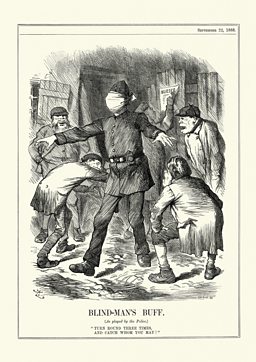Ripper Retold: Why it鈥檚 time to turn the spotlight away from the murderer
One of history's most famous villains.
A serial killer whose mere name invokes both terror and delight.
Nobody knows who Jack the Ripper was, but his notoriety spans the globe.
And yet, the story runs far deeper. The Ripper’s five victims have been dismissed as pitiful, drink-sodden sex workers. Society’s waste.
Historian Hallie Rubenhold has been digging – and she has uncovered a very different narrative.
In 大象传媒 Sounds series Bad Women: Ripper Retold, she is setting the record straight…

The story of Jack the Ripper is based on myth and conjecture
Given the sheer amount of material on Jack the Ripper’s life, Rubenhold assumed there had to be some undisputed concrete facts upon which it was all anchored. She was wrong.
In the first episode, she explains: “Instead of a sturdy bedrock of written evidence, I was met with more and more sand.”
She realised that much of the primary source information was incomplete. Where there are gaps, they are filled by newspaper accounts that allowed the grisly details to cloud the truth.
What’s more, her work to uncover the victims’ stories has been met with fierce opposition from so-called Ripperologists.
The way Rubenhold sees it: “The famous Jack the Ripper story is built on nothing, propped up by the hearsay work of true crime enthusiasts and amateur sleuths.”
In such circumstances does legend flourish.
The portrayal of the victims is wrong
Polly Nichols. Annie Chapman. Elizabeth Stride. Catherine (Kate) Eddowes. Mary Jane Kelly.
Five women that, to Rubenhold, have been reduced to “little more than cartoon characters” in the story of Jack the Ripper. The more she discovered about them, the angrier she got.
None of the women were originally from the East End. At one time, each of them would have been classed as ‘respectable’. They began life as daughters and wives of carpenters, coachmen, soldiers or gentlemen’s valets. All but one of them were mothers. They were talented, rebellious, brave and kind-hearted.
“I strongly disagree that any of them were ‘bad women’,” Rubenhold says. “It was not their fault they ended up poor and vulnerable in Whitechapel.”
The labels they received came from society, then and now
Rubenhold asserts that, while the women were “not angels”, they do not deserve the assumptions history has slapped upon them. The podcast hears from historians, criminologists and crime writers to establish the varied and sad realities of their circumstances.
For working class women in the 19th century, laws around wages, health, divorce and addiction, put them at a huge disadvantage.
Melanie Clegg left Ripperology because of how its followers regard the female victims. She suggests “casual misogyny” is behind the downplaying of their lives.
“I presume that’s why they are misrepresented or forgotten,” she tells Ripper Retold. “Most people didn’t think the women were worth the effort.”
Rubenhold agrees: “Jack the Ripper may have been their killer - but society was the accomplice.”
The assumptions made remain damaging today
These events may have happened more than 130 years ago, but Bad Women argues they still have relevance today, in part due to the fascination they still inspire in popular culture.
Ignoring the victims to focus on the mysterious killer paves the way to make light of violence, even to treat the murders as a perverse form of entertainment.
Modern day sex worker Grace tells the podcast: “These things persist even now. If we choose to dehumanise a woman as ‘the sex worker’, such actions against them can almost be seen as acceptable.”
The obsession with Jack the Ripper is dangerous
Head to Whitechapel and there are any number of tours to give thrill-seekers scope to retrace Jack the Ripper’s steps from 130 years ago. It is very easy to snap up a commemorative mug and T-shirt.
“He has seeped into our culture and we don’t seem to want to get rid of him,” says writer and historian, Matthew Sweet. “He’s a ghost we’ve made friends with – a party entertainer.”
But Bad Women has no interest in the killer’s identity. It will not entertain speculation or glorify in grisly details. In fact, Rubenhold believes the case will never be solved so it is time to move on.
“The interesting part is what we can all learn from it,” she concludes. “Why the women died. It is not because they were engaged in certain trades – it is because they were women and they were poor.
“That’s the new story I am telling – and it is one that has made me a lot of enemies.”
Listen now to Bad Women: Ripper Retold on 大象传媒 Sounds

-
![]()
Revisionist History
Malcolm Gladwell's journey through the overlooked and the misunderstood.
-
![]()
Short History Of...
Witness history's most incredible moments and remarkable people.
-
![]()
Murder They Wrote with Laura Whitmore and Iain Stirling
Laura Whitmore and Iain Stirling dive into some of the world's most jaw-dropping crime stories.
-
![]()
History's Secret Heroes
Helena Bonham Carter shines light on extraordinary stories from World War Two.





